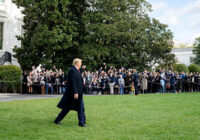According to a recent poll conducted by Invamer, Colombia’s president Ivan Duque is facing a historically low popularity after little over a year in office. The announcement followed months of continued struggles for Alvaro Uribe’s protégé, which include (but are not limited to) his legislative initiatives being blocked by the opposition, and millions of Colombians going to the streets to protest against his government. But why do so few Colombians approve of President Duque? Can he turn these numbers around during the next three years?
Several reasons are behind the president’s low popularity, including the perception among his supporters that Duque is not governing with enough assertiveness; an outsized focus on foreign policy and a series of faux pas in that realm; unpopular economic measures and macroeconomic indicators; and a growing support for the implementation of the 2015 peace agreement with the Revolutionary Armed Forces of Colombia (FARC), which Duque’s party fiercely opposes.
In recent months, President Duque has faced a string of widespread protests airing diverse grievances across major cities — from calls to protect sharks along Colombia’s coastlines to those demanding the elimination of ESMAD, a riot-police squad responsible for the death of 18-year-old Dilan Cruz during the protests. Although Duque’s administration has begrudgingly engaged in dialogue with some of the protest leaders after days of public pressure, his government is standing by most of its agenda and moving forward with policy decisions.
Dissident Guerrillas Are Rearming in Colombia
However, Duque’s accommodating attitude and openness to dialogue with the opposition have let down many of his supporters, both in politics and among civil society. The fact that Duque didn’t simply stick to his guns and dismiss the protests as a Maduro-orchestrated plot frustrated some of the more heavy-handed members of his own party.
The same happened when he removed his former minister of defense after it was made public that new cases of “falsos positivos” — the so-called “false positives,” referring to the killing of civilians by Colombia’s military to inflate the numbers in the war against the guerillas — have allegedly occurred and that the Colombian army had killed seven minors in a bombing campaign against FARC dissidents.
Foreign Policy, Economics and Peace
Another driver behind President Duque’s low approval rating is the fact that he has spent a good amount of time engaged in overseas diplomacy, both on the economic and political fronts. During the early months of 2019, Duque spent a significant amount of time and resources focused on the political situation in Venezuela, which might have been better spent dealing with the situation of Venezuelans in Colombia, whose numbers are estimated to have surpassed 1.5 million last year.
During the height of Juan Guaido’s momentum to gain power in Venezuela in 2019, Duque hosted Guaidó and their Chilean and Paraguayan counterparts at the iconic border city of Cucuta for a communications operation featuring mountains of much-needed aid for Venezuela and a concert. In the frenzy of it all, Duque talked about the imminent transition toward democracy in Venezuela. A year later, said transition has yet to happen.
During his year in office, President Duque has made more than 20 trips abroad and spearheaded regional efforts — time that might have been better spent focussing on domestic issues.
The national economy has been another controversial front for the president. According to the latest numbers from Colombia’s National Statistics Bureau and despite studies that suggest that the national GDP will keep growing, the unemployment rate has risen to approximately 10%. Additionally, despite Duque’s campaign promise not to raise taxes for average citizens, in December he passed a tax legislation, known as the Law of Economic Growth, that lowers the income threshold for tax payers while decreasing duties and royalties for enterprises.
Lastly, there is the peace process. It is no secret that President Duque has overlooked and sought to alter some, if not all, of the commitments underwritten by the Colombian state during the presidency of Juan Manuel Santos. According to The New York Times, 57% of the laws related to the peace accords are yet to pass congress, and Duque’s vocal attacks against the Special Peace Jurisdiction system are accompanied by his inability to address the security concerns of ex-FARC members. The last report on Colombia’s peace process presented to the UN Security Council concluded that 2019 has been the deadliest year for demobilized guerilla members.
This development (or lack thereof) is worrisome for the more than 6 million Colombians who voted to ratify the final agreement in the 2016 referendum and for those who support it nowadays. A Gallup Poll notes that, even though 67% of Colombians still believe in dialogue with armed groups, almost the same percentage feels that the implementation is going astray. Trust in both the government and the guerrillas is very low.
In the Shadows
His first year in office has not been kind to President Duque. Beyond the many individual themes that he has addressed, there is both national and international consensus that Duque’s government lacks a unique, defined flavor. While President Santos focused his policies and his personal image around the peace process, as Alvaro Uribe had done with his seguridad democrática, Duque has not yet adopted a banner for himself. His policies lack a defined direction.
This identity vacuum is a double-edged sword. On the one hand, his detractors find it impossible to differentiate him from Uribe and his party, an association that won Duque the presidency in the first place. However, now that Uribe’s popularity is also dipping, the strong association might represent a liability for Duque. “The young leader needs to emerge from his sponsor’ shadow,” wrote The Economist.
President Duque’s lukewarm policies have also angered his own party, which has complained of his lack of a follow-through on bold campaign promises and of his reluctance to do as Uribe advises. Amidst the November 2019 protests that paralyzed Colombia, Fernando Londono, a senior figure belonging to the most radical wing of the Democratic Center party, went as far as to suggest openly that Duque ought to resign: “Someone has to govern, and if President Duque does not want to, if he is busy in the many conversations he has, someone has to be in charge.”
In short, Ivan Duque’s historically low popularity accounts for his inability to convince both his voters and his opponents of his agenda. Until he is able to set his priorities and give his presidency a distinctive character, the prospect of President Duque escaping the shadow of his predecessors will elude him.
The views expressed in this article are the author’s own and do not necessarily reflect Fair Observer’s editorial policy.
Support Fair Observer
We rely on your support for our independence, diversity and quality.
For more than 10 years, Fair Observer has been free, fair and independent. No billionaire owns us, no advertisers control us. We are a reader-supported nonprofit. Unlike many other publications, we keep our content free for readers regardless of where they live or whether they can afford to pay. We have no paywalls and no ads.
In the post-truth era of fake news, echo chambers and filter bubbles, we publish a plurality of perspectives from around the world. Anyone can publish with us, but everyone goes through a rigorous editorial process. So, you get fact-checked, well-reasoned content instead of noise.
We publish 2,500+ voices from 90+ countries. We also conduct education and training programs
on subjects ranging from digital media and journalism to writing and critical thinking. This
doesn’t come cheap. Servers, editors, trainers and web developers cost
money.
Please consider supporting us on a regular basis as a recurring donor or a
sustaining member.
Will you support FO’s journalism?
We rely on your support for our independence, diversity and quality.






